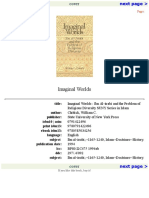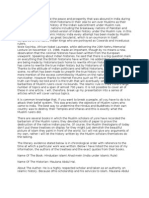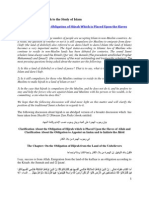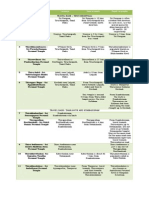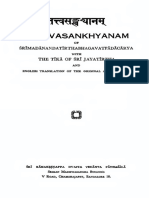Ibn Fadlan DQ 2
Ibn Fadlan DQ 2
Uploaded by
api-708238769Copyright:
Available Formats
Ibn Fadlan DQ 2
Ibn Fadlan DQ 2
Uploaded by
api-708238769Original Title
Copyright
Available Formats
Share this document
Did you find this document useful?
Is this content inappropriate?
Copyright:
Available Formats
Ibn Fadlan DQ 2
Ibn Fadlan DQ 2
Uploaded by
api-708238769Copyright:
Available Formats
11/30/23, 10:35 AM DQ Ibn Fadlan Day 3 10:30AM: Prescilla Pascua
from DQ Ibn Fadlan Day 3 10:30AM Oct 24, 2023 2:29PM
1) One veiled threat that Almish uses on Ibn Fadlan is the fact that intelligent people are
sacrificed. We can infer that Almish knows that Ibn Fadlan is trying to play smart by
lying about the money, especially when he taunts him by referring to him as, "Abu Bakr
the Truthful" (Ibn 2012, 54). However, Almish refuses to give up the money he is expecting, so
Ibn Fadlan is told that, "If they see a man that whose mind is lively and who knows many
things, they say: 'This man deserves to serve our Lord'" (Ibn 2012, 58). I interpreted this as
Almish showing Ibn Fadlan that if he continues to play out his lie about the money and spread
his teachings about Islamic religion, then the people will eventually find him so intelligent that
he should be sacrificed.
2) Ibn Fadlan's descriptions of the Rus people seem to contradict each other. He first
describes their physical appearance as beyond perfect, yet they are filthy in their hygiene. For
example, when describing how the men of the house "clean" themselves, Ibn says that there is
a basin passed around with filthy water, and after the master uses it to wash his hands, hair,
and blow his nose and spit into the water, the water is reused for the rest of the men in that
house (Ibn 2012, 64). They also practice sex in gruesome ways in which slave girls are used
for the man's pleasure in a public setting. I think we can infer that the Rus people are greedy
and participate in activities that satisfy their desires because they do many things for their own
pleasure. In one instance, Ibn Fadlan describes their offerings to their idols in which they place
the offering to their idol in exchange for a merchant with money who will buy them whatever
they want without complaint (Ibn 2012, 65). They also tend to value the rich over the poor as
seen in the way they bury them. The burial of a rich or noble man requires more work and
sacrifice than that of a poor man. The funeral of a noble man is so great that one of his slave
girls must die with him (Ibn 2012, 66). Overall, the higher up one is in their societal ladder, the
more respect and sacrifices they earn.
4) Ibn Fadlan keeps his descriptions in his travel documentation uniform for the most part. He
typically starts off with which group of people he's going to be talking about, then moves into
how they practice religion, to how "clean" they present themselves to be, and a list of
consequences for bad behavior. The only description of a certain group that deviated from his
typical patterns would be the Khazars, in which he only describes the norms for the King. It is
said that, "No one, except those whom we have mentioned, have access to him" (Ibn 2012,
71). Those who have access to him include the lieutenant and second in command man. This
tells us that the Khazars aren't really under control of their King, but rather other positions of
authority are to maintain laws and punishments. The King is isolated from his people and
doesn't necessarily use his authoritative figure to govern them.
Question: Why is there not much said about the Khazar people?
https://canvas.asu.edu/courses/166386/assignments/4498203/submissions/879999 1/1
You might also like
- Imaginal WorldsDocument316 pagesImaginal WorldsTalib0% (1)
- Guru Nanak Dev Ji His Life and Teachings by Kartar Singh PDFDocument335 pagesGuru Nanak Dev Ji His Life and Teachings by Kartar Singh PDFDr. Kamalroop Singh100% (1)
- Ibn Sirin 1 Ibn Sirin PDFDocument3 pagesIbn Sirin 1 Ibn Sirin PDFHasnain MehediNo ratings yet
- Ahul-Taqwa 1-3Document32 pagesAhul-Taqwa 1-3Light Upon Light100% (1)
- An Ocean Without Shore - Ibn Arabi's Views On The Book and The Law by Michel ChodkiewczDocument99 pagesAn Ocean Without Shore - Ibn Arabi's Views On The Book and The Law by Michel ChodkiewczagardenamidstflamesNo ratings yet
- Jainism - CelibacyDocument5 pagesJainism - CelibacyDisha TNo ratings yet
- College of Arts & Sciences: Chapter/Lesson BuddhismDocument17 pagesCollege of Arts & Sciences: Chapter/Lesson BuddhismGenierose YantoNo ratings yet
- Ibn Fadlan DQ 1Document1 pageIbn Fadlan DQ 1api-708238769No ratings yet
- The Verdicts of The Scholars Regarding Osama Bin LadenDocument11 pagesThe Verdicts of The Scholars Regarding Osama Bin LadenThe Permanent Committee for Scholarly Research & Iftaa'No ratings yet
- Persecution of Hindus by MuslimsDocument13 pagesPersecution of Hindus by Muslimsrashid_ekm100% (1)
- UIL2712 Presentation (T10) (Tutorial Question12) (SOR WAI KIT)Document25 pagesUIL2712 Presentation (T10) (Tutorial Question12) (SOR WAI KIT)苏伟杰No ratings yet
- Slave Boys in Paradise the Text of the QDocument18 pagesSlave Boys in Paradise the Text of the QamundhaaveNo ratings yet
- Jinns and Their ActivitiesDocument3 pagesJinns and Their ActivitiesAbbyr NulNo ratings yet
- Best Collection of Stories - Marhaba Ya MustafaDocument25 pagesBest Collection of Stories - Marhaba Ya MustafaRe AzNo ratings yet
- QuranicStudiesShaykhChinggizKhanDocument17 pagesQuranicStudiesShaykhChinggizKhanMD RADWAN AHAMEDNo ratings yet
- Cantrell PaperDocument5 pagesCantrell Papergarrett.lu27No ratings yet
- An Interview With A Muslim JinniDocument25 pagesAn Interview With A Muslim Jinniotaku shopNo ratings yet
- Dr. B. R. Ambedkar - Pakistan or Partition Dia (1945)Document3 pagesDr. B. R. Ambedkar - Pakistan or Partition Dia (1945)nd8028029No ratings yet
- Understanding The World of Ibn Al-Athir PDFDocument16 pagesUnderstanding The World of Ibn Al-Athir PDFbilkaweNo ratings yet
- Conquest of Mexico DQDocument1 pageConquest of Mexico DQapi-708238769No ratings yet
- Anthropomorphism by Allamah Zahid Al-KawthariDocument12 pagesAnthropomorphism by Allamah Zahid Al-KawthariAmshad KhanNo ratings yet
- Ibn Khaldun S Views On Race Influences by Early Life Childhood Climate Geography and Geographic SegmentationDocument8 pagesIbn Khaldun S Views On Race Influences by Early Life Childhood Climate Geography and Geographic SegmentationMaa PararatnaNo ratings yet
- Khidr, The History of A Ubiquitous MasterDocument7 pagesKhidr, The History of A Ubiquitous MasterHasan BasriNo ratings yet
- Calamities of Ahmed DeedatDocument21 pagesCalamities of Ahmed DeedatkabdazizNo ratings yet
- INTERVIEW WITH JINNI (f16) Blog PDFDocument25 pagesINTERVIEW WITH JINNI (f16) Blog PDFBadara Ndiaye100% (1)
- Demystifying Islamic Rule in IndiaDocument7 pagesDemystifying Islamic Rule in IndiaAbhijeetNo ratings yet
- Caring For The Needy Populations in The Era of Bani Marin (642-870AH - 1244-1465AD)Document10 pagesCaring For The Needy Populations in The Era of Bani Marin (642-870AH - 1244-1465AD)m.kacha.nldNo ratings yet
- Ibn e KhuldunDocument26 pagesIbn e KhuldunTayyaba HameedNo ratings yet
- Clarification About The Obligation of Hijrah Which Is Placed Upon The Slaves of AllahDocument15 pagesClarification About The Obligation of Hijrah Which Is Placed Upon The Slaves of AllahAbu Samirah0% (1)
- CH 5 Nomadic Empire-For PrintDocument6 pagesCH 5 Nomadic Empire-For Printjabby5506No ratings yet
- Maulana Husain Azad's Darbar-E Akbari: Some Preliminary Cultural and Sociological NotesDocument14 pagesMaulana Husain Azad's Darbar-E Akbari: Some Preliminary Cultural and Sociological NotesUbaidUllahraaifNo ratings yet
- Ayn Al Qudat Al Hamadhani His Work and His Connection With The Early ChishtisDocument16 pagesAyn Al Qudat Al Hamadhani His Work and His Connection With The Early ChishtisashfaqamarNo ratings yet
- The Life and Teachings of MohammedDocument750 pagesThe Life and Teachings of MohammedAmna FazalNo ratings yet
- Temple Descration - EatonDocument37 pagesTemple Descration - EatonramanxsehgalNo ratings yet
- Reddit. Did Ibn Khaldun Actually Say ThisDocument8 pagesReddit. Did Ibn Khaldun Actually Say Thisabdul azizNo ratings yet
- Ibn Al-Jawzī, Virtues of The Imam A Mad Ibn AnbalDocument3 pagesIbn Al-Jawzī, Virtues of The Imam A Mad Ibn AnbalcenterforislamicsciencesNo ratings yet
- Fitnatul WahhabiyaDocument20 pagesFitnatul WahhabiyaImtiyazNo ratings yet
- Sirah NabawiyahDocument190 pagesSirah NabawiyahMadz RiedoneNo ratings yet
- Muslims Destroying Hindu TemplesDocument9 pagesMuslims Destroying Hindu TemplesMarco Passavanti100% (1)
- Akbar and Social Inequities PDFDocument12 pagesAkbar and Social Inequities PDFMirza SaquibNo ratings yet
- Islam Iman Ihsan MahabatullahDocument8 pagesIslam Iman Ihsan MahabatullahMd. ShihabNo ratings yet
- Badayuni K.A. NizamiDocument5 pagesBadayuni K.A. Nizamisverma6453832No ratings yet
- The Period in Which Ghazali Lived: The Socio-Political Situation and The Spiritual EnvironmentDocument4 pagesThe Period in Which Ghazali Lived: The Socio-Political Situation and The Spiritual EnvironmentresearchparksNo ratings yet
- The Objective of Metaphysics in Ibn Sabins Answers To The Sicilian Questions by Yousef Casewit PDFDocument16 pagesThe Objective of Metaphysics in Ibn Sabins Answers To The Sicilian Questions by Yousef Casewit PDFsabscribdNo ratings yet
- Deobandia Wahabia KhawarjiaDocument21 pagesDeobandia Wahabia KhawarjiaTariq Mehmood TariqNo ratings yet
- Plague Demographic Upheaval and Civilisational Decline Ibn Khald N and Mu Ammad Al-Shaq R On The Black Death in North Africa and Islamic SpainDocument15 pagesPlague Demographic Upheaval and Civilisational Decline Ibn Khald N and Mu Ammad Al-Shaq R On The Black Death in North Africa and Islamic Spainthecornered tigersNo ratings yet
- The Bait-ul-Mal and Its DepartmentsDocument2 pagesThe Bait-ul-Mal and Its Departmentsabmm.disNo ratings yet
- The World of JinnDocument8 pagesThe World of JinnShahid Khan85% (13)
- 63d518ab0aa556 17565082Document15 pages63d518ab0aa556 17565082Hansini PunjNo ratings yet
- Reading The Emergence of Islamic StateDocument5 pagesReading The Emergence of Islamic StateMinas MonirNo ratings yet
- That Prophet Muhammad HadDocument21 pagesThat Prophet Muhammad Hadawal1100% (1)
- Luqman of The Scroll, Luqman of The Qur'an: Wisdom Traditions in Conversation With TafasirDocument12 pagesLuqman of The Scroll, Luqman of The Qur'an: Wisdom Traditions in Conversation With TafasirtveknachNo ratings yet
- Emergence of DajjalDocument117 pagesEmergence of Dajjalahmad_adam_17100% (1)
- Hijrat e MadinaDocument7 pagesHijrat e Madinasuhailbai50% (2)
- Moral in The Works of Alisher NavoiDocument5 pagesMoral in The Works of Alisher NavoiAcademic JournalNo ratings yet
- Ghost Riders of Upper Egypt: A Study of Spirit PossessionFrom EverandGhost Riders of Upper Egypt: A Study of Spirit PossessionNo ratings yet
- Human Event Labor Log 2Document1 pageHuman Event Labor Log 2api-708238769No ratings yet
- Paper 1Document5 pagesPaper 1api-708238769No ratings yet
- Paper 3 FinalDocument6 pagesPaper 3 Finalapi-708238769No ratings yet
- Writing Self-Evaluation 1Document2 pagesWriting Self-Evaluation 1api-708238769No ratings yet
- Paper 2 DraftDocument6 pagesPaper 2 Draftapi-708238769No ratings yet
- Paper 1 DraftDocument4 pagesPaper 1 Draftapi-708238769No ratings yet
- Review of Pedagogy of The Oppressed From A Marxist PerspectiveDocument6 pagesReview of Pedagogy of The Oppressed From A Marxist PerspectiveSarthak NayakNo ratings yet
- Sama Veda Upakarma 2023 MantrasDocument9 pagesSama Veda Upakarma 2023 Mantrassaranya venkatNo ratings yet
- Tamilnadu Divya Desam Travel GuideDocument9 pagesTamilnadu Divya Desam Travel GuideshasvinaNo ratings yet
- 1538 3730 1 SMDocument9 pages1538 3730 1 SMdamalena afianiNo ratings yet
- Alvarez vs. IACDocument1 pageAlvarez vs. IACCaitlin KintanarNo ratings yet
- OrrorshDocument130 pagesOrrorshBarbie Turic100% (5)
- World Literature I. Works and AuthorsDocument2 pagesWorld Literature I. Works and AuthorsRiesel TumangNo ratings yet
- The Doomed PrinceDocument4 pagesThe Doomed Princeomoday2562022No ratings yet
- Jesus Christ Street MissionDocument14 pagesJesus Christ Street MissionAyobami DignityNo ratings yet
- Spiritual Warfare Edited 1Document6 pagesSpiritual Warfare Edited 1osilaokasehobariNo ratings yet
- File No 3Document7 pagesFile No 3dinozzo1210No ratings yet
- El Banquete de PlatónDocument2 pagesEl Banquete de PlatónDaniel CarvajalNo ratings yet
- (V) Social Movements in Modern India: (A) Peasants and Farmers MovementsDocument29 pages(V) Social Movements in Modern India: (A) Peasants and Farmers MovementsArNo ratings yet
- SSS - 19-12-Discover Your Divine EssenceDocument3 pagesSSS - 19-12-Discover Your Divine EssencemsrrNo ratings yet
- Personal Discipleship PlanDocument2 pagesPersonal Discipleship PlanJohn BotkinNo ratings yet
- Choose One of The Three Famous Artworks. in A 250-Word Essay, Explain The Possible Meaning (S) of The Said SubjectDocument1 pageChoose One of The Three Famous Artworks. in A 250-Word Essay, Explain The Possible Meaning (S) of The Said SubjectClandy CoNo ratings yet
- Muallim Ul InshaDocument156 pagesMuallim Ul InshaAbdullah MNo ratings yet
- Maping The Development of Critical Thinking in IslDocument15 pagesMaping The Development of Critical Thinking in IslGAZZA PEDIANo ratings yet
- Goetia Girls Com GermoriDocument23 pagesGoetia Girls Com GermoriEnoch Gandhislilbrother Abraham46% (13)
- Peringkat No Kel Nama Asal Sekolah SkorDocument4 pagesPeringkat No Kel Nama Asal Sekolah SkorAhmad Afiif NaufalNo ratings yet
- Paper2 13 PDFDocument29 pagesPaper2 13 PDFArundhati VijayaNo ratings yet
- Ethics Module Lesson3Document6 pagesEthics Module Lesson3Cristine Mae PreguntaNo ratings yet
- Tattva-Sankhyan of Madhvacharya With The Tika of JayatirthaDocument156 pagesTattva-Sankhyan of Madhvacharya With The Tika of JayatirthaRamana Pingili (Yamuna Jivan Das)No ratings yet
- Mushroom Effigies in World Archaeology - Giorgio Samorini NetworkDocument28 pagesMushroom Effigies in World Archaeology - Giorgio Samorini NetworkeremenkoinfoNo ratings yet
- A Valediction Forbidding Mourning by John DonneDocument4 pagesA Valediction Forbidding Mourning by John DonnedacdeNo ratings yet
- Cover PageDocument8 pagesCover Pageapi-273331379No ratings yet
- Character Analysis of Joseph AndrewsDocument2 pagesCharacter Analysis of Joseph Andrewshassankhalilawan4No ratings yet
- Mantra For Vanishing DiseasesDocument37 pagesMantra For Vanishing DiseasesCA Vaibhav Maheshwari100% (12)


